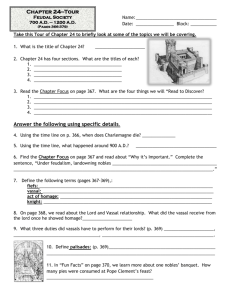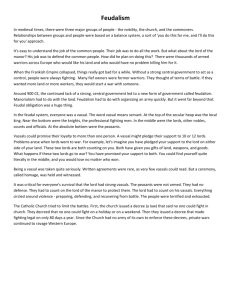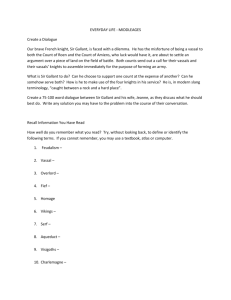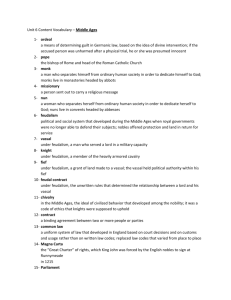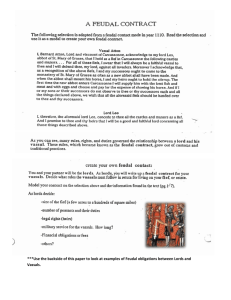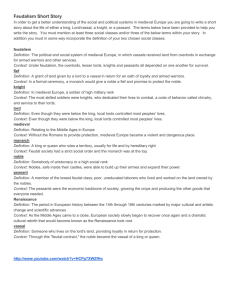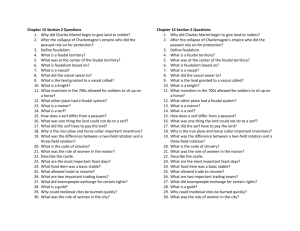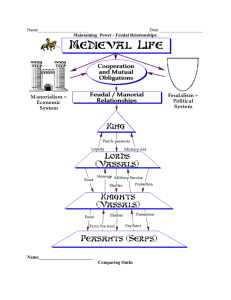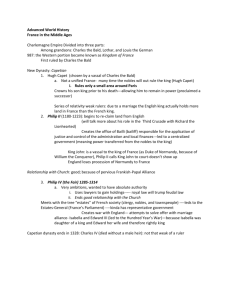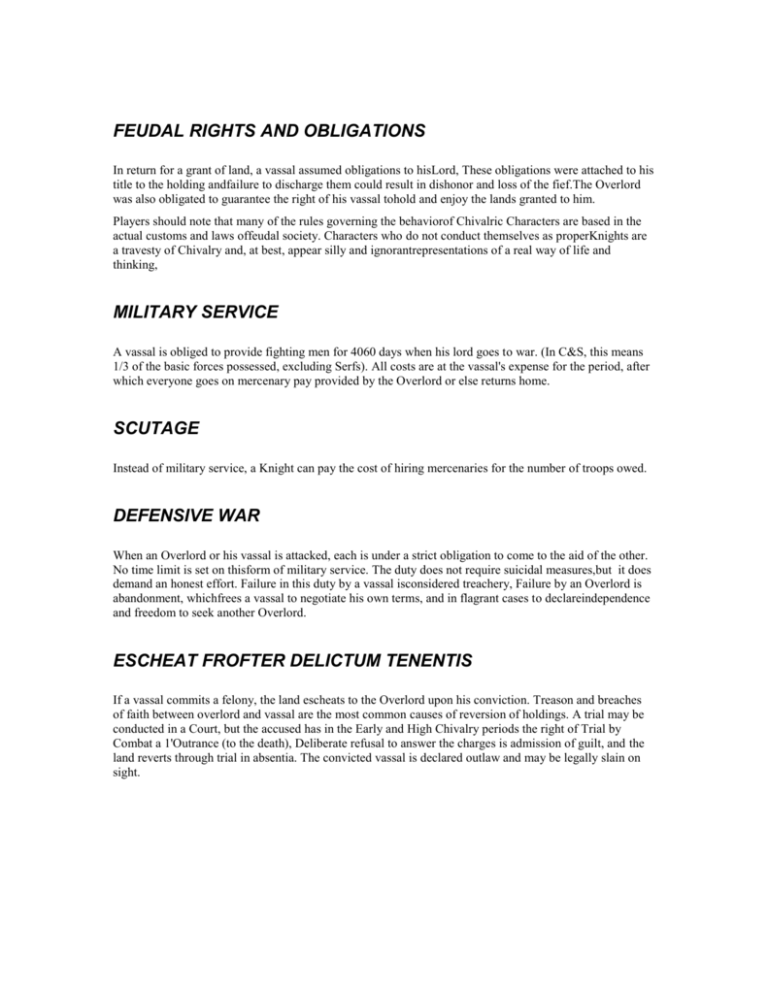
FEUDAL RIGHTS AND OBLIGATIONS
In return for a grant of land, a vassal assumed obligations to hisLord, These obligations were attached to his
title to the holding andfailure to discharge them could result in dishonor and loss of the fief.The Overlord
was also obligated to guarantee the right of his vassal tohold and enjoy the lands granted to him.
Players should note that many of the rules governing the behaviorof Chivalric Characters are based in the
actual customs and laws offeudal society. Characters who do not conduct themselves as properKnights are
a travesty of Chivalry and, at best, appear silly and ignorantrepresentations of a real way of life and
thinking,
MILITARY SERVICE
A vassal is obliged to provide fighting men for 4060 days when his lord goes to war. (In C&S, this means
1/3 of the basic forces possessed, excluding Serfs). All costs are at the vassal's expense for the period, after
which everyone goes on mercenary pay provided by the Overlord or else returns home.
SCUTAGE
Instead of military service, a Knight can pay the cost of hiring mercenaries for the number of troops owed.
DEFENSIVE WAR
When an Overlord or his vassal is attacked, each is under a strict obligation to come to the aid of the other.
No time limit is set on thisform of military service. The duty does not require suicidal measures,but it does
demand an honest effort. Failure in this duty by a vassal isconsidered treachery, Failure by an Overlord is
abandonment, whichfrees a vassal to negotiate his own terms, and in flagrant cases to declareindependence
and freedom to seek another Overlord.
ESCHEAT FROFTER DELICTUM TENENTIS
If a vassal commits a felony, the land escheats to the Overlord upon his conviction. Treason and breaches
of faith between overlord and vassal are the most common causes of reversion of holdings. A trial may be
conducted in a Court, but the accused has in the Early and High Chivalry periods the right of Trial by
Combat a 1'Outrance (to the death), Deliberate refusal to answer the charges is admission of guilt, and the
land reverts through trial in absentia. The convicted vassal is declared outlaw and may be legally slain on
sight.
PRIVATE WAR
Again in the Early and High Chivalry periods, a Knight or Lord hadthe right to go to war to settle
grievances. Generally, the Overlords donot extend such a right to their vassals, but they do resort to battle
tosettle differences between themselves. A Knight could resort to privatewar if he regards himself falsely
accused by his Overlord-- but he hadbetter win or else acquire powerful allies if he wants to avoid the
consequences of treason and rebellion, The same is true of great Lords atwar with their suzerain, the King.
RELIEF
When a new tenant succeeds to land (as by inheritance), the Overlord is entitled to 6D10% of the yearly
income of the fief or baronialholding in the first year, Also, proof of title has to be shown if thelands are
held directly from the King, costing 1 D1O% of the annual income in addition to relief.
0
AID FOR RANSOM
When an Overlord is captured, he can require his vassals to pay 3/4of the amount, divided amongst them
according to their net incomes.Ransoms are only subject to Aid in war, and can be required only oncein any
given year.
AID FOR KNIGHTHOOD
The knighting of an Overlord's eldest (surviving) son is an expensive business because honor demands a
lavish ceremony and tournament, To help defray the costs, a once in a lifetime Aid of 1 month's net income
can be demanded of each vassal. (Lifetime = Lord's lifetime, not the vassals').
AID FOR MARRIAGE
An Overlord usually married off his eldest daughter to cement an important political/military alliance. A
considerable dowry was necessary. Thus a once in a lifetime aid of 1 month's net income can be de manded
of each vassal.
WARDSHIP
When an existing tenant dies, leaving a male heir under 21 or a female under 25, the Overlord has the right
to control the estate and en joy all of the revenues until the ward comes of age, The Overlord does not have
to account for his use of the money, which is rightfully his, but he cannot mortgage or sell the lands and
buildings. He also can choose a marriage partner for the ward. If the ward refuses, he is entitled to a full
year's income once the ward assumes control of the lands. If the ward marries without his consent, he is
entitled to two year's income from the estates. Finally, upon coming of age, the ward must sue for livery to
enforce delivery of the lands to his/her control, For this the Overlord is paid SD1O% of the net yearly
income of the lands. Wardship is also assignable and can be given to a faithful follower as a reward for
good service, It should be noted, in closing, that wardship was incredibly valuable to the guardian, but not
all guardians gouged their wards to the limit permitted by the law, A 50% cut of the revenues during
wardship was considered to be quite reasonable, with the remainder used for the ward's best interests. A
larger proportion would tend to create bad feelings between the ward and guardian--promising
rebelliousness later.
PAYING COURT
A vassal was expected to wait upon the pleasure of his Overlord whenever his suzerain required a great
retinue to give him prestige in his baronial court, at tournaments, etc. At such times, a large retinue reminds
other lords that a noble has ample military power at his disposal. Also, a vassal might be called upon to sit
in judgement in the Overlord's legal court- a matter of great responsibility and honor. A vassal failing to
pay due court tended to earn his Overlord's displeasure and disfavor.
HOSPITALITY
A vassal was expected to render his Overlord proper hospitality when honored by a visit. For his part, the
Overlord will avoid taxing a vassal's resources to the limit by bringing a great entourage which will despoil
the castle larder for months thereafter. Needless to say, such visitations are regarded with mixed feelings by
many vassals.
LARGESSE
Any Lord, including even lesser Knights with small fiefs, is expected to give largesse, This includes honors
and gifts given to trusted vassals for services rendered, and alms to the poor and needy,
LOYALTY
Both Overlord and vassal are always expected to render due respect and support to the other. Vassals must
never betray secrets to which they are privy nor go over to the enemies of the Overlord. To do so is treason
most foul, Nor may an Overlord abuse the rights of a vassal, To do so gives good cause to renounce feudal
vows of homage and fealty (although a vassal had better be ready to fight hard, for his Overlord will then
accuse him of treason even when he himself forced the whole situation).
HOMAGE AND FEALTY
The bond between vassal and Overlord can be best understood by examining the ceremonies of homage
and fealty which seal the relationship between suzerain and vassal. The homage of the vassal and the
Overlord's response are as follows:
'Sire, I enter into your homage and faith and become your man, by mouth and hands, and I swear and
promise to keep faith and loyalty to you against all others, saving only the just rights of those from whom I
hold other fiefs and rights and I swear to guard your rights with all my strength and my life',
'We do guarantee you, our faithful vassal, that we and our heirs will guarantee to you the lands held of us,
to you and your heirs against every creature with all our power, to hold these lands and enjoy their use in
peace and in quiet',
The oath of homage is the vow to serve the Overlord faithfully and is utterly tied to title in the lands
received, To break the oath is to renounce title, and the Overlord can repossess them, The vow of the
Overlord is a vow to personally protect all of the rights of his vassal.
The oath of fealty is sworn by the vassal upon holy relics:
'in the name of God and in reverence for these sacred relics, I swear that I will truly keep the vow which I
have taken and will always remain faithful to my leige lord'.
Upon swearing fealty, the vassal receives a lance, glove, baton, or other symbol from his Overlord,
indicating that he has been invested in the possession of his fief.
FEUDAL LAW
No society has ever existed without some form of legal system to govern its operation. Even the most
barbaric cultures had laws, taboos, customs, and traditions to set out prescribed and accepted behaviors,
complete with a range of persuasions and punishments to bring wrong- thinking individuals into line Some
players chafe at the idea that there should be any restraints on their behavior in a 'fantasy' world. Consider,
however, that a Thievish Character has no meaning in a world without law. Fart of the fun of being a Thief
is experiencing the adrenalin surges that come with the chance of being caught. When one considers the
punishments prescribed in feudal law for thievery, a Thief has full justification for being a bit nervous. But
laws apply to all Characters. The fact that Someone Else is in charge acts as a brake on the Player who
thinks he can bully his way through. Put in feudal terms, a nobleman reserved the right to sheer his sheep to
himself. He resented poachers, in his demesne. Did anyone ever wonder why rough and tough barbarians
like Conan the Conqueror were always on the move in fantasy fiction? The answer is that they offended
against local law and order. Notice also how devoted to maintaining the laws such lawless characters
become the moment
they succeed to the position of Overlord! If one desires to take on all of society,
fine. But the law represents the prevailing views of what is right and wrong in society.
FEUDAL HIGH JUSTICE
High Justice is a right reserved to the nobility and favoured Knights. In some realms, it is reserved to the
King alone and his appointed just ices. High Crimes carry the death penalty.
Because of the high station of the nobility, the only crimes they can be accused of under this form of justice
are treason, rebellion, or conspiracy against a liege lord. The accused can elect for Trial by Combat a
1'Outrance or trial by court. Penalties are:
1
Temporary loss of Honour. Dishonour could last for 1 month to 1 year.
2
Disgrace Permanent loss of Honour), subject to performance of some great deed to restore
that Honour.
3
Disgrace and loss of lands.
4
Disgrace, loss of lands, and banishment.
5
Death.
If a noble vassal is treated unfairly, he could stage an honorable rebellion against his suzerain. The ultimate
rule, however, is that he win his fight. Losing is dangerous to one's health in such cases. At the same time,
an Overlord must be able to prove charges levelled against a vassal. The feudal bonds are based on mutual
trust and good faith. Vassals take willful charges against one of their fellows as cause to examine their own
loyalty.
LOW JUSTICE
Low Justice or Common Justice was largely reserved to the commoners and is administered by the King's
Justices or by Barons in their own private courts. There are four distinct groups of crimes in this area:
HIGH CRIMES
All crimes in this section carry the death penalty:
TREASON, REBELLION, CONSPIRACY, & ESPIONAGE are punishable by hanging, drawing, and
quartering.
MURDER
is punishable by hanging by the neck until dead.
POISONING
is punishable by burning at the stake.
CANNIBALISM & SKINNING BODIES
stake.
PURJURY
is punishable by being thrownto wild dogs or burning at the
is punishable by hanging by the neck until dead.
DESCECRATION OF A TEMPLE OR HOLY PLACE
is punishable by burning at the stake.
ARSON is punishable by death by hanging or burning at the stake.
SMUGGLING is punishable by a fine no less than 1 silver piece, and no more than 100SP (plus
confiscation of all goods), 36 lashes, or death by hanging, depending on the severity of the offense and the
number of convictions. A 'lash' requires a CON Roll at -3 or a point of Body damage is suffered.
RIDING A HORSE
is punishable by 10 lashes. Repeated offenses are seen as lese majeste and are
punishable by death by hanging. However.Petit Sergeants and wealthy commoners may be granted special
rights in this regard. Of course, Knights and members of the military are exempt.
STRIKING A FOOL
is punishable by 5 lashes and a day in the stocks. Feeble-minded folk are
protected from abuse. Unusually brutal treatment may merit the death penalty (hanging).
DRAWING WEAPON ON GENTILITY is punishable by death by hanging, drawing and quartering for
rebellion- if the offender survives thewrath of the Knight or Noble so insulted.
ASSAULT
ASSAULT carries a penalty of 20 lashes. if blood is shed or if there is amaiming or
serious wounding, the penalty may be death by hanging.
THEFT carries a variety of punishments, depending upon the offense:
PIRACY
carries the punishment of death by hanging or by 1000 lashes
HORSE THEFT is punishable by death by hanging.
THEFT OF PEPPER OR SILK
is punishable by cutting of the throat
ROBBERY ON THE KING'S HIGHROAD is punishable by death by hanging.
POACHING IN THE ROYAL FOREST
in a forest belonging to a noble.
SLAYING OF A KING'S DEER
is punishable by death by flaying.
THEFT OF A BEAST OF BURDEN
CATTLE
LIFTING
is punishable by loss of a hand. The same is true of poaching
is punishable by 24 lashes.
is punishable by 24 lashes.
MUGGING is punishable by 24 lashes. A second offense brings loss of a hand and branding. A third
offense carries the penalty of death hanging. if blood is shed,
ASSAULT
WITH INTENT TO WOUND
•s charged.
CUTFURSE
is punishable by 24 lashes. A second offense brings loss of a hand and branding. A third
offense carries the penalty of death by hanging. The offense includes all forms of non-violent theft from the
owner's person.
BURGLARY
is punishable by 36 lashes. A second offense brings loss of hand and branding. A third
offense carries the penalty of death by hanging. All forms of breaking and illegal entry are included, and
act~a" theft need not be proved, only the entry itself.
STEALING
is punishable by 12 lashes. The offense includes theft c+ items under the value of 5 SF
from shop stalls, yards, etc.
TORTS
or injury to person or property include both intentional and nag'gent damage. Nobles may
bring actions against each other for torts ana may also do so on behalf of vassals or common rank.
DESTRUCTION OF PROPERTY brings full restitution or compensation if unintentional and double or
triple damages (punitive) if intentional. Commoners may also receive up to 24 lashes for intentions'
damage.
INJURY TO FERSOr
brings compensation. A commoner receives ~SF + 1d6 SF per body point lost.
A noble receives 1 GF + idlO GP per body point lost (tripled for titled nobles). if the offense was
deliberate. a commoner may also be charged with ASSAULT.
A deliberate
offert by a commoner against a noble is
REBELLION. Nobles charged M:mm the
offense will always insist on Trial by Combat, as such matters are affairs of honor.
REFLEVIN
is an action to recover property in the possession of atother. Nobles are forced to resort to
it if they are not prepared to go private war against another noble. If the property cannot be restored to the
owner in fit condition, damages will be awarded.
BUSINESS LAW
governs most transactions:
FRAUD is any false representation of goods or making false promises which lead to financial loss to the
victim. Penalties tend to be 1-3 times the profit made on the deal plus restitution or full compensation to the
victim.
DEBT is failure to pay what one owes in the agreed time period. The aggrieved party may sue for
payment. This may result in the seizure of money, lands, cattle, or other goods to secure the repayment.
Nobles secure their debts with sealed deeds (promises) which even a commoner can enforce in a Royal
Court. Impoverished commoners can be forced into service to repay debts. Refusal to make enforced
payment by service is punishable by death if the debtor runs away.
BREACH OF CONTRACT is failure to live up to one's word, which need not be written down, only
witnessed to be an oral contract. The Court will enforce the recovery of financial losses or order the terms
of the agreement to be carried out in full.

